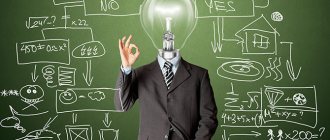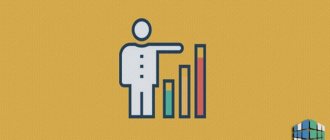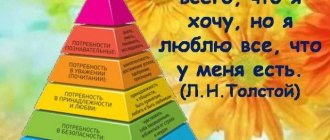Every day we are faced with many tasks, the solution of which requires our ability to think logically. Logic as the ability to think and reason consistently and consistently is required in many life situations, from solving complex technical and business problems to persuading interlocutors and making purchases in a store.
But despite the high need for this skill, we often make logical mistakes without knowing it. Indeed, among many people there is an opinion that it is possible to think correctly on the basis of life experience and so-called common sense, without using the laws and special techniques of “formal logic”. To perform simple logical operations, express elementary judgments and simple conclusions, common sense can also be suitable, but if we need to understand or explain something more complex, then common sense often leads us to errors.
In addition, they explain to us the principles of finding solutions to tasks in a rather primitive way. As for the development of verbal-logical thinking (or verbal-logical), the ability to correctly perform mental operations, consistently come to conclusions, for some reason we are not taught this. That is why the level of development of people's logical thinking is not high enough.
We believe that a person’s logical thinking and his ability to cognition should develop systematically and on the basis of a special terminological apparatus and logical tools. During the classes of this online training, you will learn about self-education methods for the development of logical thinking, get acquainted with the main categories, principles, features and laws of logic, and also find examples and exercises for applying the acquired knowledge and skills.
What is logical thinking?
To explain what “logical thinking” is, let’s divide this concept into two parts: thinking and logic. Now let's define each of these components.
Human thinking is a mental process of processing information and establishing connections between objects, their properties or phenomena of the surrounding world. Thinking allows a person to find connections between the phenomena of reality, but in order for the connections found to truly reflect the true state of affairs, thinking must be objective, correct or, in other words, logical, that is, subject to the laws of logic.
Logic translated from Greek has several meanings: “the science of correct thinking”, “the art of reasoning”, “speech”, “reasoning” and even “thought”. In our case, we will proceed from the most popular definition of logic as a normative science about the forms, methods and laws of human intellectual mental activity. Logic studies ways to achieve truth in the process of cognition in an indirect way, not from sensory experience, but from knowledge acquired earlier, therefore it can also be defined as the science of ways to obtain inferential knowledge. One of the main tasks of logic is to determine how to come to a conclusion from existing premises and gain true knowledge about the subject of thought in order to gain a deeper understanding of the nuances of the subject of thought being studied and its relationships with other aspects of the phenomenon under consideration.
Now we can define logical thinking itself.
Logical thinking is a thought process in which a person uses logical concepts and constructions, which is characterized by evidence, prudence, and the goal of which is to obtain a reasonable conclusion from existing premises.
There are also several types of logical thinking; we list them, starting with the simplest:
1
Figurative-logical thinking
Figurative-logical thinking (visual-figurative thinking) - various thought processes of the so-called “figurative” problem solving, which involves a visual representation of the situation and operating with images of its constituent objects. Visual-figurative thinking, in fact, is synonymous with the word “imagination”, which allows us to most vividly and clearly recreate the whole variety of different actual characteristics of an object or phenomenon. This type of human mental activity is formed in childhood, starting from approximately 1.5 years.
To understand how developed this type of thinking is in you, we suggest you take the IQ Test “Raven’s Progressive Matrices”
The Raven's Test is a progressive matrix scale for assessing IQ, mental ability, and logical thinking, developed in 1936 by John Raven and Roger Penrose. This test can give the most objective assessment of the IQ of the people being tested, regardless of their level of education, social class, type of activity, linguistic and cultural characteristics. That is, it can be said with a high probability that the data obtained as a result of this test from two people from different parts of the world will evaluate their IQ equally. The objectivity of the assessment is ensured by the fact that this test is based solely on images of figures, and since Raven's matrices are among non-verbal intelligence tests, its tasks do not contain text.
The test consists of 60 tables. You will be offered drawings with figures connected to each other by a certain relationship. One figure is missing; it is given at the bottom of the picture among 6-8 other figures. Your task is to establish a pattern that connects the figures in the picture and indicate the number of the correct figure by choosing from the proposed options. Each series of tables contains tasks of increasing difficulty, at the same time, the complication of the type of tasks is observed from series to series.
Statistics Full screen
2
Abstract logical thinking
Abstract-logical thinking is the performance of a thought process using categories that do not exist in nature (abstractions). Abstract thinking helps a person model relationships not only between real objects, but also between abstract and figurative ideas that thinking itself has created. Abstract logical thinking has several forms: concept, judgment and inference, which you can learn more about in the lessons of our training.
3
Verbal and logical thinking
Verbal-logical thinking (verbal-logical thinking) is one of the types of logical thinking, characterized by the use of linguistic means and speech structures. This type of thinking requires not only the skillful use of thought processes, but also competent command of one’s speech. We need verbal-logical thinking for public speaking, writing texts, arguing, and in other situations where we have to express our thoughts using language.
At this point, we suggest you practice a little:
Now let's continue.
Functions
In psychology, it is generally accepted that mental activity always builds a connection between events or phenomena. A person must analyze information and make conclusions. The tool for these actions is logical thinking. This means that in this case such an ability as cognition moves to a new level. The above process also has a regulatory and communicative purpose. This technique is useful when building communication between people and when conducting joint activities. Logic also allows you to put forward various versions and draw certain conclusions with their help.
So, a person defines his thoughts with the help of words. They can be expressed orally or in writing. It should be noted here that a person acquires these skills in childhood, when he has contacts with adults. Then thinking is developed, which can have the following varieties:
- visual-figurative;
- effective;
- verbal-logical;
- abstract-logical.
Visual-figurative and visual-effective thinking are always associated with the perception of objects when a person interacts with them. But verbal-logical thinking is already based on certain concepts. This is how the knowledge of patterns and relationships in the surrounding reality occurs.
Ultimately, thinking reaches a certain level, then complete ordering of practical actions occurs.
If we talk about abstract logical thinking, then it should be noted that it is also abstract. This type is based on the detection of significant properties, connections, as well as their separation. In this case, properties and connections are divided into essential and less essential.
When cognitive activity begins, the thought process acquires the following functions:
- the role of concepts is classified;
- problems related to life are solved.
- the management of an individual’s activities is facilitated by understanding reality; this process also helps to plan behavior, set goals, and so on;
- both the activity itself and its result are analyzed, and reflection is included in this process.
In addition, the functions of logic are as follows:
- methods of thinking are catalogued, and thinking itself arrives at the truth;
- to study ways of implementing thought processes, the development of theories is included in the overall process;
- the created theories undergo formalization and take the form of symbols or signs.
Important! Logic and thinking have exactly the same functions. For example, logic is always a correct thought process. When a person thinks logically, he uses various techniques to find ways to achieve excellent mental results that lead him to the truth.
Applying logic
Thinking using the tools of logic is necessary in almost any area of human activity, including the exact sciences and humanities, economics and business, rhetoric and public speaking, the creative process and invention. In some cases, strict and formalized logic is used, for example, in mathematics, philosophy, and technology. In other cases, logic only provides a person with useful techniques for obtaining a reasonable conclusion, for example, in economics, history, or simply in ordinary “life” situations.
As already mentioned, we often try to think logically on an intuitive level. Some people do it well, some do it worse. But when connecting the logical apparatus, it is better to know exactly what mental techniques we use, since in this case we can:
- It’s more precise to choose the right method that will allow you to come to the right conclusion.
- Think faster and better - as a consequence of the previous point.
- It's better to express your thoughts.
- Avoid self-deception and logical fallacies.
- Identify and eliminate errors in other people’s conclusions, cope with sophistry and demagoguery.
- Use the necessary argumentation to convince your interlocutors.
Useful tips
To develop logic, it is not enough to pay attention to problems, solve puzzles, crosswords, and read specialized literature. There are some more tips:
- Left-handers should learn to write with their right hand and vice versa. This will improve the functioning of the less developed part of the brain.
- Change the type of activity from time to time. For example, do one thing for an hour or two, and then change jobs.
- Read detective stories, trying to predict what the main character and other characters will do in a given case. This process promotes the development of deduction.
- Explain your actions and actions. A thorough analysis of daily incidents makes it possible to build logical chains and draw conclusions regarding how best to proceed next time.
It is also worth being outside more often. Walking improves brain function in general.
Components of logical thinking
The use of logical thinking is often associated with quickly solving logic tasks and passing tests to determine the level of intellectual development (IQ). But this direction is associated to a greater extent with bringing mental operations to automatism, which is a very insignificant part of how logic can be useful to a person.
The ability to think logically combines many skills in the use of various mental actions and includes:
- Knowledge of the theoretical foundations of logic.
- The ability to correctly perform such mental operations as: classification, specification, generalization, comparison, analogy and others.
- Confident use of key forms of thinking: concept, judgment, inference.
- The ability to argue your thoughts in accordance with the laws of logic.
- The ability to quickly and effectively solve complex logical problems (both educational and applied).
Of course, such operations of thinking using logic as definition, classification and categorization, proof, refutation, inference, conclusion and many others are used by every person in his mental activity. But we use them unconsciously and often with errors, without a clear idea of the depth and complexity of those mental actions that make up even the most elementary act of thinking. And if you want your logical thinking to be truly correct and rigorous, you need to learn this specifically and purposefully.
Where is it used?
Children, with the help of abstract thinking, draw, design, sculpt, understand the meaning of riddles, can solve problems, and coherently express their thoughts when describing events. During school years, this type of mental activity helps schoolchildren master mathematics, which requires the ability to operate with a lot of data, divide them into groups, and look for relationships.
Abstract thinking is used in logic, physics, astronomy and other exact sciences, where one must be able to measure, count, calculate, and combine elements into one group. It is necessary for psychologists, philosophers, writers, engineers. Time management is unthinkable without it.
In everyday life, people also constantly use abstract-logical mental activity. Examples of abstract thinking reflect everyday human thought processes. Planning often intersects in the imagination with dreams and fantasies. Young people looking for a job can come up with so many things that, when faced with reality, they cannot stand the conditions offered to them. So girls, waiting for a prince on a white horse, mentally endow their future chosen one with unrealistic traits. This inevitably leads to disappointment in the future.
How to learn this?
Logical thinking is not given to us from birth, it can only be learned. There are two main aspects of teaching logic: theoretical and practical.
Theoretical logic
, which is taught at universities, introduces students to the basic categories, laws and rules of logic.
Practical training
aimed at applying the acquired knowledge in life. However, in reality, modern teaching of practical logic is usually associated with passing various tests and solving problems to test the level of intelligence development (IQ) and for some reason does not address the application of logic in real life situations.
To truly master logic, you need to combine theoretical and applied aspects. Lessons and exercises should be aimed at developing intuitive, automated logical tools and consolidating the acquired knowledge in order to apply it in real situations.
Based on this principle, the online training that you are reading now was compiled. The purpose of this course is to teach you to think logically and apply logical thinking techniques. Classes are aimed at introducing the basics of logical thinking (thesaurus, theories, methods, models), mental operations and forms of thinking, rules of argumentation and laws of logic. In addition, each lesson contains tasks and exercises to train you to use the acquired knowledge in practice.
Development methods
The development of abstract thinking is a long and labor-intensive process. But everything is not as scary as it might seem at first glance. In order to develop this type of thinking, a person only needs to devote an hour or an hour and a half two to three times a week to solving logical problems and puzzles. This is a very exciting process, and before you know it, it will become your favorite hobby! In the modern world, there are enough printed publications for the development of logic; exercises and assignments can also be found on the Internet. This means that finding such information will not be difficult. For example, there is a popular website that presents problems of varying complexity.
This type of thinking originates in the East since the times of the ancient world. It arose as a branch of logic. Logic itself is the ability to think and reason, to draw conclusions about things and their essence. Abstract thinking allows you to build theoretical schemes.
With regular exercise, the results will not take long to arrive. Within a few weeks, you will notice that it has become easier to think, make long-term plans, and solve issues that previously caused difficulty.
Children
The little man is an open book in which you can write anything! Children are more receptive to learning and developing any abilities. The baby’s abilities need to be developed through play. The modern toy industry offers a wide selection of games for early development. For example, these could be small puzzles, mosaics, or a banal pyramid. In adulthood, to teach your child to think, invite him to look at pictures in books and explain his understanding of what is happening in them.
Teaching a child to think abstractly is very important. Abstract thinking is not only the key to his creative development, but it is also the ability to question everything and achieve everything through experience.
Developed thinking helps to collect, analyze information and draw independent conclusions, and then support them with proven facts.
Logic lessons
Having collected a wide range of theoretical materials, as well as having studied and adapted the experience of teaching applied forms of logical thinking, we have prepared a series of lessons for the full mastery of this skill.
Lesson 1. Logical analysis of language
We will devote the first lesson of our course to a complex but very important topic - the logical analysis of language. It’s worth mentioning right away that this topic may seem abstract to many, loaded with terminology, and inapplicable in practice. Don't be scared! Logical analysis of language is the basis of any logical system and correct reasoning. The terms that we learn here will become our logical alphabet, without knowledge of which we simply cannot go further, but gradually we will learn to use it with ease.
Lesson 2. Concept in logic
A logical concept is a form of thinking that reflects objects and phenomena in their essential features. Concepts come in different types: concrete and abstract, individual and general, collective and non-collective, irrespective and correlative, positive and negative, and others. Within the framework of logical thinking, it is important to be able to distinguish these types of concepts, as well as produce new concepts and definitions, find relationships between concepts and perform special actions on them: generalization, limitation and division. You will learn all this in this lesson.
Lesson 3. Definition in logic
In the first two lessons, we talked about how the task of logic is to help us move from an intuitive use of language, accompanied by errors and disagreements, to a more orderly use of it, devoid of ambiguity. The ability to handle concepts correctly is one of the skills required for this. Another equally important skill is the ability to correctly define. In this lesson we will tell you how to learn this and how to avoid the most common mistakes.
Lesson 4. Logical reasoning
Logical judgment is a form of thinking in which something is affirmed or denied about the surrounding world, objects, phenomena, as well as relationships and connections between them. Judgments in logic consist of a subject (what the judgment is about), a predicate (what is said about the subject), a copula (what connects the subject and the predicate) and a quantifier (the scope of the subject). Judgments can be of various types: simple and complex, categorical, general, particular, individual. The forms of connectives between the subject and the predicate also differ: equivalence, intersection, subordination and compatibility. In addition, within the framework of composite (complex) judgments there can be their own connectives, which define six more types of complex judgments. The ability to think logically presupposes the ability to correctly construct various types of judgments, understand their structural elements, features, relationships between judgments, and also check whether a judgment is true or false.
Lesson 5. Laws of logic
Before moving on to the last third form of thinking (inference), it is important to understand what logical laws exist, or, in other words, objectively existing rules for constructing logical thinking. Their purpose, on the one hand, is to help build inferences and argumentation, and on the other hand, to prevent errors and violations of logic associated with reasoning. This lesson will examine the following laws of formal logic: the law of identity, the law of excluded middle, the law of contradiction, the law of sufficient reason, as well as De Morgan's laws, the laws of deductive inference, Clavius' law and the laws of division. By studying examples and completing special exercises, you will learn how to purposefully use each of these laws.
Lesson 6. Inference
Inference is the third form of thinking in which from one, two or more propositions, called premises, a new proposition, called a conclusion or conclusion, follows. Inferences are divided into three types: deductive, inductive and analogical inferences. In deductive inference (deduction), a conclusion is drawn from a general rule for a particular case. Induction is inference in which a general rule is derived from several particular cases. In inferences by analogy, based on the similarity of objects in some characteristics, a conclusion is drawn about their similarity in other characteristics. In this lesson you will become familiar with all types and subtypes of inferences and learn how to build various cause-and-effect relationships.
Lesson 7. Syllogisms
This lesson will focus on multi-premise inferences. Just as in the case of single-premise conclusions, all the necessary information in a hidden form will already be present in the premises. However, since there will now be many premises, the methods for extracting them become more complex, and therefore the information obtained in conclusion will not seem trivial. In addition, it should be noted that there are many different types of multi-premise inferences. We will focus only on syllogisms. They differ in that both in the premises and in the conclusion they have categorical attributive statements and, based on the presence or absence of some properties in objects, they allow one to draw a conclusion about the presence or absence of other properties in them.
Lesson 8. Types of reasoning
In previous lessons we talked about various logical operations that form an important part of any reasoning. Among them were operations on concepts, definitions, judgments and inferences. This means that at this point it should be clear what components the reasoning consists of. However, we have not yet touched upon the questions of how reasoning as a whole can be organized and what types of reasoning there are in principle. This will be the topic of the last lesson. Let's start with the fact that reasoning is divided into deductive and plausible. All types of inferences discussed in previous lessons: inferences using a logical square, appeals, syllogisms, enthymemes, sorites, are precisely deductive reasoning. Their distinctive feature is that the premises and conclusions in them are connected by a relation of strict logical consequence, while in the case of plausible reasoning there is no such connection. First, let's talk more about deductive reasoning.
How to take classes?
The lessons themselves with all the exercises can be completed in 1-3 weeks, having mastered the theoretical material and practiced a little. But to develop logical thinking, it is important to study systematically, read a lot and constantly train.
For maximum effect, we recommend that you first simply read all the material, spending 1-2 evenings on it. Then take 1 lesson daily, doing the necessary exercises and following the suggested recommendations. After you have mastered all the lessons, engage in effective repetition using this technique to remember the material for a long time. Next, try to apply logical thinking techniques more often in life, when writing articles, letters, when communicating, in disputes, in business, and even in your leisure time. Reinforce your knowledge by reading books and textbooks, as well as using additional material, which will be discussed below.
Books and textbooks on logic
On this page we have selected useful books and textbooks that will help you deepen your knowledge of logic and logical thinking:
- "Applied Logic".
Nikolai Nikolaevich Nepeyvoda; - "Textbook of Logic".
Georgy Ivanovich Chelpanov; - "Logic: lecture notes."
Dmitry Shadrin; - "Logics.
Training course" (educational and methodological complex). Dmitry Alekseevich Gusev; - “Logic for Lawyers” (collection of problems).
HELL. Getmanova; - "Logics.
Textbook for law schools." IN AND. Kirillov, A.A.Starchenko - "Logics.
Textbook for high school." Vinogradov S.N., Kuzmin A.F. - "Logics.
Textbook for humanities faculties." A.A.Ivin - "Logics".
Ivanov E.A. - And others.
Trainings
Training and development of logical thinking can be supplemented by the following trainings, which you can take for free on our website:
1. Memory and attention are important abilities for logical thinking, which will allow you to concentrate on a large number of mental objects on which logical operations are carried out.
2. Creative thinking together with logic will give you the opportunity not only to draw correct conclusions, but to look for non-standard solutions where logic has reached a dead end.
3. Oratory and writing skills form verbal and logical thinking, and also allow you to apply the acquired knowledge in practice in this course.
4. Mental arithmetic and speed reading are suitable for developing and training intellectual abilities.
5. Human psychology is useful in understanding logical thinking, because it is psychology as a science that studies mental operations, motives, and incentives of a person.











